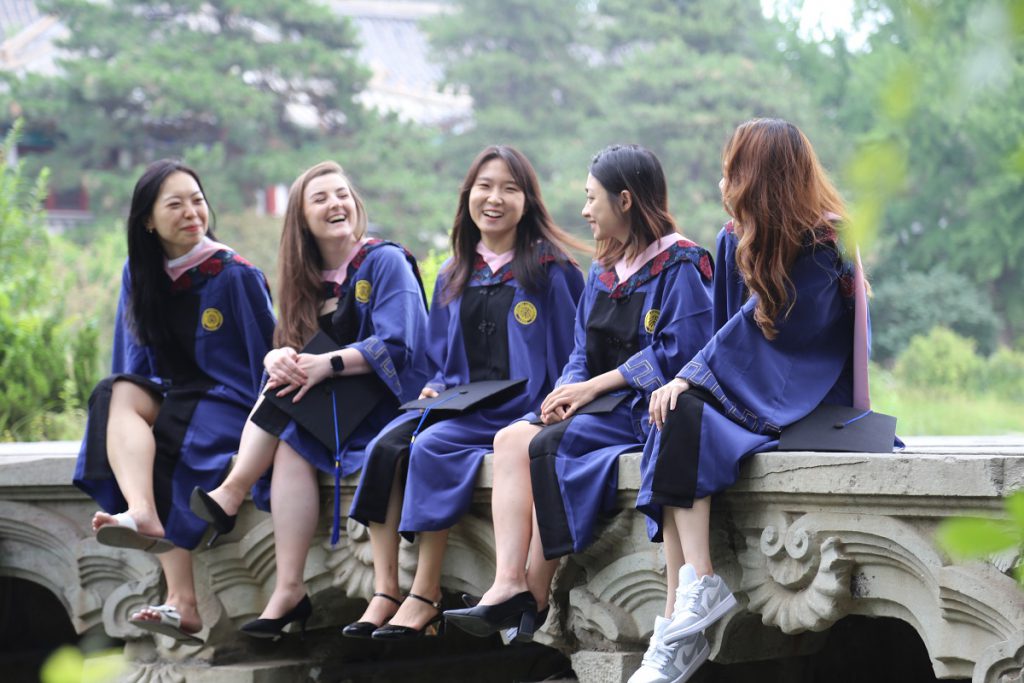Greetings everyone. I feel really privileged to introduce myself. My name is Jungsoo Moon. I recently finished the CAMPUS Asia Program at the University of Tokyo (DD), Peking University (DD), and Seoul National University (EX), where I am a graduate student in the Department of Public Policy. It seems like only yesterday that I submitted my application for this course as an undergraduate, thus it is an honor to meet you now as a graduate student.
I want to start by thanking everyone who worked on organizing and creating the Campus Asia program. I also want to express my gratitude to my friends and colleagues who have supported me and helped me develop over the past few years. Without further ado, let me describe my 2.5-year journey in the hopes that it would provide prospective students with a more positive perspective on the program and encourage them to enroll in it.
I am a Korean born in South Africa. I was born in 1995, the year Apartheid, the infamous system of racial segregation, was abolished. As a result, I was raised in an environment where I was constantly exposed to global concerns like racism, border disputes, and cultural and language barriers. These issues led me to wonder, “Why do people hate and discriminate against one another based on skin color?” This question mark naturally gravitated me toward the study of international relations.
Afterward, I went on to study in Korea and the US, did an internship at an UN-affiliated NGO, encountered various issues in real life, and began to reflect on the role of Korea, Japan, and China in the global context. Just as how I had a question about racial discrimination as a young child, these experiences made me ask “Why are Korea, Japan, and China constantly in conflict? Where did the seeds of the conflict come from? What steps can we take to move from conflict to cooperation?”
That’s how I decided I wanted to study more about Northeast Asia in depth, and thanks to a professor, I learned about and applied to this program called Campus Asia. It couldn’t have been more ideal, as it would allow me to study and live in each Korea, Japan, and China while receiving financial support in the form of a scholarship.
The University of Tokyo (2020 Fall – 2021 Spring)
Regrettably, I was unable to travel to Japan owing to the Japanese government’s COVID restriction policy, so I had to attend lessons via Zoom. Despite this, the time spent doing so was more valuable than ever. First, each class in the “Modern Japanese Diplomacy” course had a group discussion time. While discussing how to resolve the territorial dispute between Korea, Japan, and China, one group member made the point that it’s important to consider people’s feelings as well as the political aspect of the issue. I was deeply impressed by the notion that to reach the point of agreement, we must pay attention to and consider the people’s intricately entwined emotions. In addition, in the class “Japan in Today’s World,” we learned that Japan and Korea share the same concerns regarding the advancement of women’s rights. Although these concerns may appear to be different on the surface, I felt a sense of commonality as people, and as a community of such people, sharing common concerns.
Furthermore, there was a course called GPPN (Global Public Policy Network), where two friends from CAMPUS Asia and one Singaporean friend collaborated to consider the issue of marine pollution in Korea, Japan, and China and seek out policy solutions. At that time, I realized that solving regional issues requires cooperation and unity from many nations, rather than the efforts of just one. Lastly, the CAMPUS Asia Joint Course was a perfect course to practice designing public policy and see how it would be applied in real life by jointly working with the people in charge of Yoichi Town in Hokkaido, Japan. I enjoyed each session so much as I was able to learn how to balance theory and practicality.
The thought of how much more I could have learned and what could have been possible if I had been able to see, learn from, and interact with people in person makes me sad because I learned so much through classes and discussions that year. Nevertheless, it was an opportunity to actively communicate with professors, classmates, and peers via Zoom. Because of this, I was able to study the course for a full year with gratitude in my heart, feeling a great deal of love and affection despite the distance.
Peking University (2021 Fall – 2022 Spring)
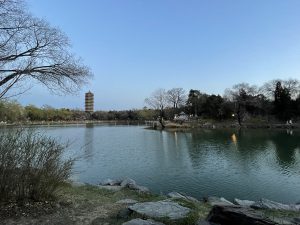
The opportunity to visit Peking University in person was an invaluable experience for me. First of all, even from the process of entering the country with China’s restriction policy, I was able to feel the difference between the systems of Korea and China. In particular, through a class called ‘Chinese Politics and Public Policy’, I was able to learn about the founding and development of Communism in China, and I was able to gain a deeper understanding of modern and current China. It was interesting to study the distinctiveness and organic nature of how China’s ethnic diversities affect domestic and foreign policies. I already enjoyed learning about Chinese history, but I was able to gain a deeper understanding of current Chinese diplomacy, domestic politics, and public policies thanks to the classes offered by Peking University. It was an opportunity to satisfy the intellectual curiosity I developed while comparing and analyzing the policies of Korea, Japan and the United States.
I am incredibly grateful to my friends and colleagues who helped me so much when I was in China. Thanks to their help, I was able to enjoy my time at school despite my limited Chinese proficiency. I will never forget the support and assistance I received from my friends. Furthermore, by making a variety of Chinese and foreign friends in China and conversing with them about a variety of topics, I was able to learn a lot about China. I was reminded of how narrow it is to have one notion and one opinion about something, especially when we talk about China, as I discovered that different friends from different regions and countries had various understandings of and perspectives on China.
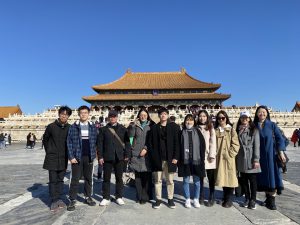
In particular, I will always remember going to the Forbidden City on a field trip from Peking University. It was an opportunity to take in the beauty of Chinese architecture while also observing how history had been incorporated. If I get the chance in the future, I would like to visit the royal palaces of Japan and other Asian countries where the history is intertwined and reflect on the legacies left by the ancestors.
Seoul National University (2022 Fall)
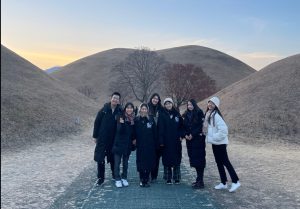
Studying Korean international policy and North Korean foreign policy, which was not offered at other schools, helped me to write my thesis more elaborately. In addition to classes, I also attended a number of guest talks on topics like democracy in Korea, the communist party system in China, foreign policy in Japan, the historical issue between Korea and Japan, and Ukraine support policy in Europe. Listening to these lectures, I discovered how others are thinking and working together for a better direction in various disciplines, and I became much more aware of the importance of education, communication, and listening.
And the best thing about Seoul National University was that I was able to reconnect with my friends and colleagues whom I hadn’t seen for two years due to Covid. Although it was only one semester, it was great because it was spent with my peers. I enjoyed our field trip to Sokcho, but what I enjoyed the most was the two-day, one-night train trip to Gyeongju on our own. It was really fun visiting many different places, eating delicious food, playing games and talking all night. It was a pleasure to share my understanding of Korean culture and history with my friends while exploring Gyeongju together, a city with a thousand-year history, and what made me happier was to see them enjoying and having fun.
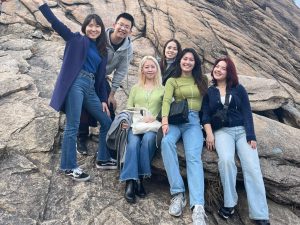
In addition to traveling to Gyeongju, we spent time together throughout the semester. As I grew closer with my friends, I came to appreciate how great it is to have friends you can walk with side by side toward the same goal regardless of differences in background, country of origin, language or culture. As CAMPUS Asia is a program where folks with similar interests and aspirations come together, it is a major strength that we can share knowledge and advice and learn from one another.
Closing
Thanks to the CAMPUS Asia program, I was able to shape my dream of becoming a diplomacy and security expert who can connect Northeast Asia and Asia. In particular, I was able to grow in many ways thanks to the support of so many wonderful friends, and I believe that the human network I gained through Campus Asia is an invaluable asset that cannot be replaced by money or other tangible items. I was able to gain a lot of knowledge as a scholar thanks to the high-quality classes offered by each university and the caring attention of my professors. During the course of two and a half years, I also had the opportunity to engage in academic discussions with people who had a wide range of perspectives, which helped me to develop both the breadth and depth of my thinking. I’d like to keep practicing to improve my Japanese and Chinese language skills, hoping that, one day, I can interact with locals to learn more about the cultures and each country deeper.
I would like to close by expressing my deepest gratitude to the University of Tokyo Campus Asia Faculty Team and GraSPP administrative staff, both of whom have always helped me promptly and kindly, even though I have never met them before.
I wish everyone good health, happiness, and success!



